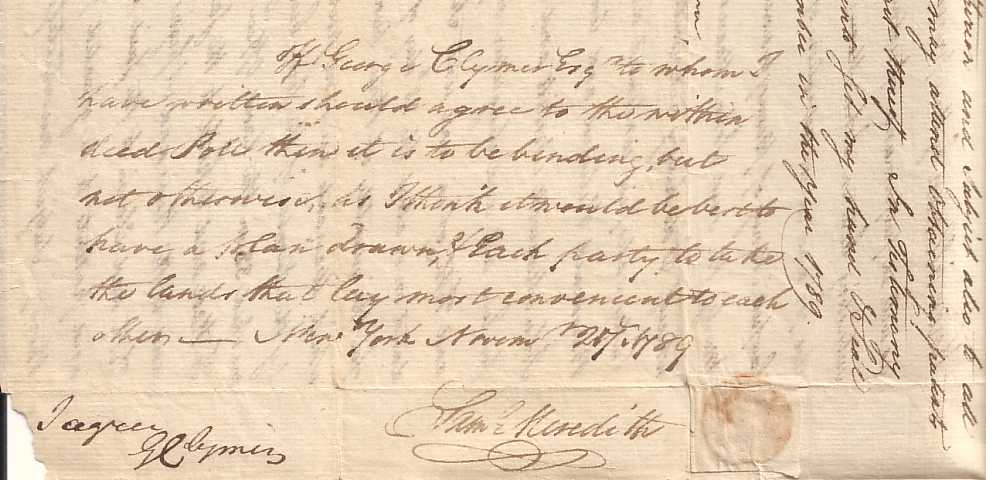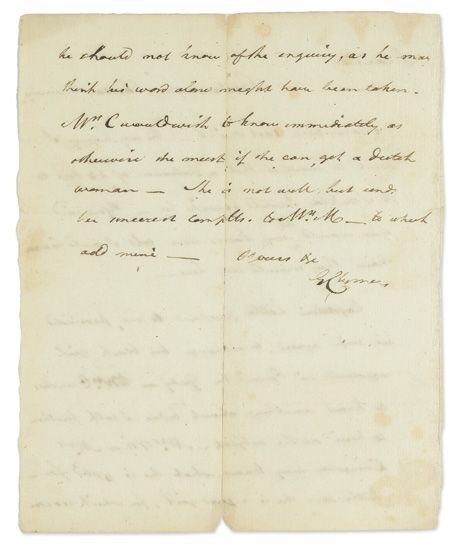CLYMER, George (1739-1813), Signer (Pennsylvania). Autograph letter signed to Tench Coxe (1755-1824). [Philadelphia?], 30 May 1794. 2 pages, 4to, integral address leaf in a clerk's hand, recipient's docket, and small seal tear . In excellent condition.
CLYMER, George (1739-1813), Signer (Pennsylvania). Autograph letter signed to Tench Coxe (1755-1824). [Philadelphia?], 30 May 1794. 2 pages, 4to, integral address leaf in a clerk's hand, recipient's docket, and small seal tear . In excellent condition. ON THE EVE OF THE "WHISKEY REBELLION." A letter which relates directly to the causes of the insurrection known as the Whiskey Rebellion. As part of Hamilton's revenue plan under the new Constitution, distilled whiskey was taxed by the Federal government, with the excise collected in each district, state by state. This tax was bitterly resented by small distillers and the many who relied on whiskey as a medium for barter, especially on the frontier. Coxe, an associate of Alexander Hamilton, served as Assistant Secretary of the Treasury from 1789, and was co-author of the critical Report on Manufactures (1791). In 1792 he was appointed Commissioner of Revenue of the United States. Here Clymer, Commissioner of Revenue for Pennsylvania, reports to him regarding annual revenue from taxes on distilled spirits for the years 1791, 1792 and 1793. Clymer apologizes for the spotty returns. "You request to be informed what half yearly returns of distilled spirits have been made...by the Inspectors...from the commencement of the revenue Law to the 31st December 1793." Clymer specifies the distillery production in three different districts, in one noting that some returns are "extremely imperfect," almost certainly as the result of resistence to the tax collectors. He promises Coxe that he will immediately "make the second treasury communications to the different inspectors...." Resistance to the whiskey excise and its enforcement, especially in western Pennsylvania, finally culminated--shortly after this letter--in mass defiance of the law, armed attacks on U.S. marshals and threats to seize the city of Pittsburgh. President Washington saw the Whiskey Rebellion as a crucial challenge to the authority of the new Federal government and called out the Pennsylvania and Virginia militia for its suppression. Hamilton himself, named acting Secretary of War, accompanied Washington's massive army, some 15,000-strong, in a brief campaign against the rebels, whose resistance promptly crumbled.
CLYMER, George (1739-1813), Signer (Pennsylvania). Autograph letter signed to Tench Coxe (1755-1824). [Philadelphia?], 30 May 1794. 2 pages, 4to, integral address leaf in a clerk's hand, recipient's docket, and small seal tear . In excellent condition.
CLYMER, George (1739-1813), Signer (Pennsylvania). Autograph letter signed to Tench Coxe (1755-1824). [Philadelphia?], 30 May 1794. 2 pages, 4to, integral address leaf in a clerk's hand, recipient's docket, and small seal tear . In excellent condition. ON THE EVE OF THE "WHISKEY REBELLION." A letter which relates directly to the causes of the insurrection known as the Whiskey Rebellion. As part of Hamilton's revenue plan under the new Constitution, distilled whiskey was taxed by the Federal government, with the excise collected in each district, state by state. This tax was bitterly resented by small distillers and the many who relied on whiskey as a medium for barter, especially on the frontier. Coxe, an associate of Alexander Hamilton, served as Assistant Secretary of the Treasury from 1789, and was co-author of the critical Report on Manufactures (1791). In 1792 he was appointed Commissioner of Revenue of the United States. Here Clymer, Commissioner of Revenue for Pennsylvania, reports to him regarding annual revenue from taxes on distilled spirits for the years 1791, 1792 and 1793. Clymer apologizes for the spotty returns. "You request to be informed what half yearly returns of distilled spirits have been made...by the Inspectors...from the commencement of the revenue Law to the 31st December 1793." Clymer specifies the distillery production in three different districts, in one noting that some returns are "extremely imperfect," almost certainly as the result of resistence to the tax collectors. He promises Coxe that he will immediately "make the second treasury communications to the different inspectors...." Resistance to the whiskey excise and its enforcement, especially in western Pennsylvania, finally culminated--shortly after this letter--in mass defiance of the law, armed attacks on U.S. marshals and threats to seize the city of Pittsburgh. President Washington saw the Whiskey Rebellion as a crucial challenge to the authority of the new Federal government and called out the Pennsylvania and Virginia militia for its suppression. Hamilton himself, named acting Secretary of War, accompanied Washington's massive army, some 15,000-strong, in a brief campaign against the rebels, whose resistance promptly crumbled.













Try LotSearch and its premium features for 7 days - without any costs!
Be notified automatically about new items in upcoming auctions.
Create an alert